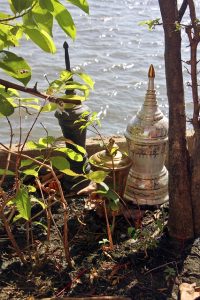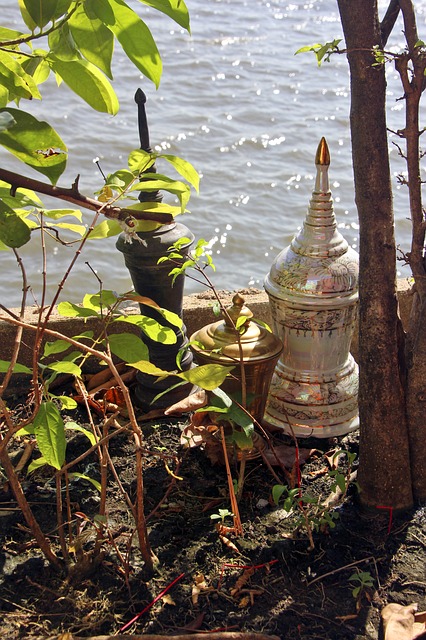 Buddhism is a path, or a set of teaching and practices, that does not include the idea of worshiping a creator god, so some people do not see it as a religion, especially in the Western countries. In fact, Buddhism does not see itself as in conflict with other religions, many practitioners would tell you that it is possible from the Buddhist perspective to be both a Buddhist and a Christian or Jew.
Buddhism is a path, or a set of teaching and practices, that does not include the idea of worshiping a creator god, so some people do not see it as a religion, especially in the Western countries. In fact, Buddhism does not see itself as in conflict with other religions, many practitioners would tell you that it is possible from the Buddhist perspective to be both a Buddhist and a Christian or Jew.
Buddhism began in India more than 2,500 years ago. It is based on the life and teachings of Siddhartha Gautama, the Buddha or the enlightened one. Since its inception, Buddhism spread across East Asia and it is now gaining an increasing following in the Western countries.
The basic tenets of Buddhist teaching are straightforward and very practical, nothing is permanent or fixed, actions have consequences and change is possible. Mindfulness and meditation are an important part of Buddhist practice.
Because Buddhism spread so widely all across Asia over such a longer period of time, there are many traditions or offshoots to Buddhism such as Tibetan, Zen, Theravada and Pure Land, these are just a few examples. These traditions have influenced the culture of the regions or countries where they are found in numerous ways, including funeral and cremation services.
Buddhism is associated with cremation as a funeral practice. Because the Buddha was himself cremated, it follows that many Buddhist practitioners choose to follow in his footsteps. However, Buddhism in general is not very particular about the exact funeral practices Buddhists are to follow. Although basic cremation is the most common choice, burial can also be done.
Individual traditions or sects do have specific funeral practices that practitioners usually follow but unlike Christianity, none of these practices have any impact on the soul or the eternal destiny of the practitioner. Buddhism holds that after a person’s death, there is no connection between the consciousness of the deceased and the body, or the remains left behind.
There is a belief that Buddhists do not care about funeral practices, they actually do, but they do not believe that anything like salvation is at stake. Buddhist funeral rites are typically meaningful, solemn and dignified, but they exist as a means of paying homage to the dead and making their transition easier, not to ensure entry into heaven.
Buddhists do believe in reincarnation or rebirth. They see death as a part of a process of continual cycle of rebirth until one has achieved the highest state of consciousness. When highest consciousness is achieved the Buddhist reaches Nirvana, a state in which there is no suffering or pain, no desire or selfishness, all karmic debts are repaid and that the cycle of death and rebirth ends.
Buddhism encompasses a wide range of funeral practices and beliefs. However, a typical Buddhist funeral usually includes cremation, although this is not a requirement. In the Tibetan tradition, a waiting period of four days after death is usually observed prior to the funeral or cremation as many Buddhists believe that the soul is still in transition for a period of time after death.
Immediately before and after the time of death, monks or teachers will lead the family of the deceased in saying prayers to help ease the transition of the soul out of the body. This is the beginning of the funeral period, which in Mayahana Buddhism, from which the Zen and Pure Land Buddhist traditions observed in Japan and China originated, can go on for up to 100 days.
The first week following the death of a loved one is usually the most important as the body is prepared for cremation, prayers will continuously be said at this time by the monks or by the family. Cremation is typically held any time after the first week. In some traditions, it may not be held for up to a month. Often the deceased will be cremated along with a few items that they liked when they were still alive, or those items that had meaning to them.
Family member will often attend the cremation and when it is over, they place the remains into an urn. Once cremated, the remains are usually buried in a small family plot. Prayers will continue to be said during the mourning period, which can last from a month up to 100 days.


